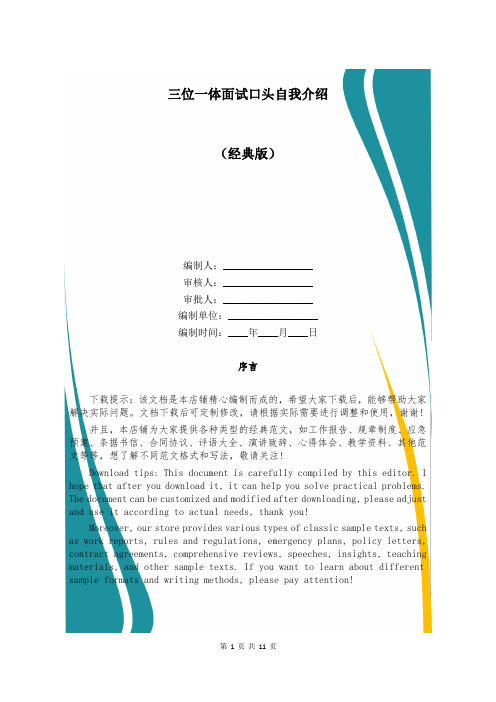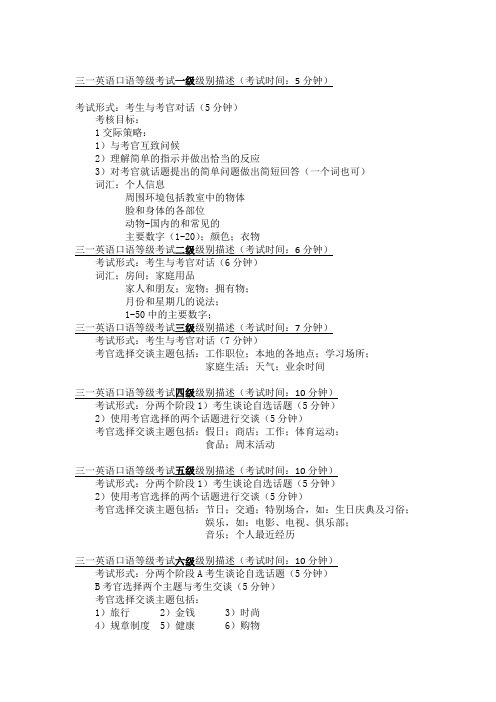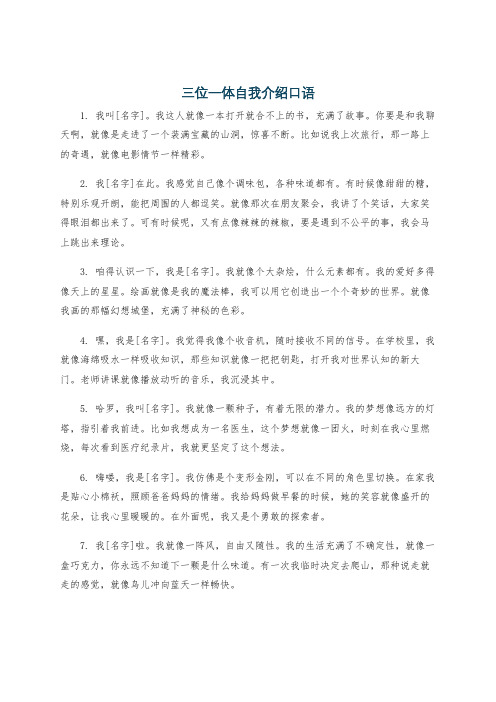三一口语全介绍
三位一体外语自我介绍

三位一体外语自我介绍英文回答:My name is Trinity, and I am a native English and Mandarin speaker with a passion for languages. Throughout my life, I have been fascinated by the intricacies and nuances of communication, both verbal and non-verbal. I firmly believe that language is not merely a tool for exchanging information but also a window into different cultures, ways of thinking, and perspectives.My linguistic journey began at a young age when I was exposed to both English and Mandarin in my family and community. I quickly developed a strong affinity for both languages, immersing myself in books, films, and conversations in both. As I grew older, my interest in languages expanded beyond just speaking and writing. I became curious about the underlying structures, the historical evolution, and the cultural implications of language.In high school, I eagerly took every opportunity to delve deeper into my love of languages. I joined the debate team, where I honed my analytical and communication skills.I also participated in Model United Nations, where I immersed myself in the nuances of diplomacy and international relations. These experiences not only strengthened my language abilities but also broadened my understanding of the world.My passion for languages led me to pursue a double major in English and Chinese at university. During my undergraduate studies, I took a wide range of courses in linguistics, literature, and translation. I spent a year abroad in Beijing, where I was fully immersed in Chinese culture and language. This experience was transformative, as it allowed me to not only improve my Mandarinproficiency but also gain a deeper understanding of Chinese history, philosophy, and society.Upon graduating from university, I worked as a translator and interpreter for several years. In this role,I had the opportunity to work with clients from diverse backgrounds, translating documents, interpreting conversations, and facilitating communication across linguistic barriers. This experience further solidified my language skills and gave me a practical understanding of the challenges and rewards of working with different languages.Currently, I am pursuing a master's degree in computational linguistics. My research focuses on developing natural language processing (NLP) models for machine translation. I am particularly interested in exploring the use of neural networks and artificial intelligence to improve the accuracy and fluency of machine-translated text. My goal is to contribute to the advancement of language technology and make cross-cultural communication more seamless and efficient.中文回答:大家好,我叫三位一体,是一名母语为英语和汉语的语言爱好者。
三位一体面试口头自我介绍

三位一体面试口头自我介绍(经典版)编制人:__________________审核人:__________________审批人:__________________编制单位:__________________编制时间:____年____月____日序言下载提示:该文档是本店铺精心编制而成的,希望大家下载后,能够帮助大家解决实际问题。
文档下载后可定制修改,请根据实际需要进行调整和使用,谢谢!并且,本店铺为大家提供各种类型的经典范文,如工作报告、规章制度、应急预案、条据书信、合同协议、评语大全、演讲致辞、心得体会、教学资料、其他范文等等,想了解不同范文格式和写法,敬请关注!Download tips: This document is carefully compiled by this editor. I hope that after you download it, it can help you solve practical problems. The document can be customized and modified after downloading, please adjust and use it according to actual needs, thank you!Moreover, our store provides various types of classic sample texts, such as work reports, rules and regulations, emergency plans, policy letters, contract agreements, comprehensive reviews, speeches, insights, teaching materials, and other sample texts. If you want to learn about different sample formats and writing methods, please pay attention!三位一体面试口头自我介绍三位一体面试口头自我介绍(精选12篇)当碰到不熟悉的人时,我们就有可能用到自我介绍,通过自我介绍可以得到他人的欣赏。
三一口语三级第1-8讲 讲义(完整版)

GESE - Grade 3 Unit 1This is My School.I. Words & Phrases方位: next to(紧挨着), beside(在…旁边), behind(在…后面), in front of(在…前面),under(在…下面), on(在…上面), in(在…里面)学校: classroom building(教学楼), gym(体育馆), playground(操场), basketball court(篮球场), library(图书馆), dining hall(食堂), gate(大门), auditorium(礼堂), dormitory building(宿舍楼), sports field(运动场), swimming pool(游泳池), slide(滑梯), swing(秋千), floor(楼层,地面), the first floor(一楼), the second floor(二楼), the third floor(三楼), teacher’s office(教师办公室), clinic(医务室), washroom(洗手间), computer room(机房), music room(音乐教室), library(图书馆), piano(钢琴), violin(小提琴)描述性: big / large(大), small / little(小), new(新的), old(旧的), beautiful(美丽的), 运动: sport(运动), sports instruments(运动器材), do sports(做运动), table tennis(乒乓球), badminton(羽毛球),其他: introduce(介绍), describe(描述), laptop(笔记本电脑), finger(手指), fist(拳头), calendar(日历),II. Key sentences (“”表示可替换)1. There’s a / an … in my school. / There’re … in my school.2. My school is very … and … (big / small, large, old / new, beautiful)3. We usually do sports in the playground.III. Q&A (“”表示可替换)1. – Is there a ... in your school? – Are there … in your school?– Yes, there is. / No, there isn’t. – Yes, there are. / No, there aren’t.2. – Where is the gym?– The gym / It is next to the playground.3. – What do you do in the gym?– I usually do sports in the gym.4. – Can you introduce the gym in your school?–The gym is very big and beautiful. There’re many sports instruments there. I usually play badminton there.5. – Can you introduce / describe your school?(or “Tell me something about your school.”)–My school is very big and beautiful. There’re a classroom building, a library, a dining hall, a gym, a playground and some basketball courts in my school. I always study and play there. I love my school very much.6. – Which floor is the washroom on? / Where is the washroom?– The washroom is on the first floor.7. – Is the library on the second floor?– Yes, it is. / No, it isn’t.8. – What’s in the library?– There are many books and bookshelves in the library.9. – What do you do in the library?– I read books in the library.10. – How many classroom buildings are there in your school?– There’re three classroom buildings in my school.GESE - Grade 3 Unit 2What Does Your Father Do?I. Words & Phrases职业: teacher, student, doctor, nurse(护士), worker(工人), singer(歌手), dancer(舞蹈演员), artist(艺术家/画家), writer(作家), editor(编辑), engineer(工程师), computer programmer(计算机编程员), hairdresser(理发师), shop assistant(店员), seller (售货员), clerk(职员), accountant(会计), manager(经理), general manager(总经理), president of the board(董事长), soldier(士兵), policeman(警察), lawyer(律师), farmer(农民), cook(厨师), waiter(男服务生), waitress(女服务生), scientist(科学家), driver(司机), pilot(飞行员), tour guide(导游), judge(法官), reporter(记者), housewife(家庭主妇), stewardess(空姐/女乘务员), secretary(秘书)家庭: family member(家庭成员), father, mother, sister(亲姐妹), brother(亲兄/弟), cousin(堂/表兄弟姐妹), grandpa, grandma, uncle(叔/舅/伯/姨父/姑父), aunt(姑/姨/婶/舅妈)场所: office(办公室), hospital(医院), school(学校), factory(工厂), company(公司), shop/store(商店), shopping mall(卖场), super market(超市), barber(理发店), TV station(电视台), newspaper office(报社)II. Q&A (“”表示可替换)1. – How many people are there in your family?– There’re … people in my family.2. – Who are they?– They’re my father, my mother, my… and me.3. – What does your father do? / What’s your father?– My father is an engineer.4. – Where does he work?– He works in an office.5. – Is he a doctor?– Yes, he is. / No, he’s a cook.6. – Does he work in a hospital?– Yes, he is. / No, he isn’t. He works in a restaurant.7. – What do your parents do?– My father is a … My mother is a …8. – Where do they work?– My father works in … My mother works in …9. – Are they very busy?– Yes, they are. / No, they aren’t.10. – How do they go to work?– My father goes to work by car. / My father drives to work.My mother goes to work by subway / by bus / by foot.GESE - Grade 3 Unit 3What’s the date today?I. Words & Phrases月份: January(Jan.), February(Feb.), March(Mar.), April(Apr.), May, June(Jun.), July(Jul.), August(Aug.), September(Sep.), October(Oct.), November(Nov.), December(Dec.)日期: date(日期), Jan. 25(Jan. the twenty-fifth / January the twenty-fifth / the twenty-fifth of January)时间: hour(小时), half an hour(半小时), quarter(15分钟;四分之一), minute(分钟), second(秒), am(上午), pm(下午)II. Q&A (“” 表示可替换)1. – How many seconds are there in a / one minute?–There’re 60 seconds in a minute.2. – How many minutes are there in an hour?– There’re 60 minutes in an hour.3. – How many hours are there in a day?– There’re 24 hours in a day.4. – How many days are there in January?– There’re 31 days in January.5. – How many months are there in a season?– There’re 4 months in a season.6. – How many seasons are there in a year?– There’re 4 seasons in a year.7. – How many months are there in a year?– There’re 12 months in a year.8. – What’s the date today? / What date is it today? (Feb. 14)– It’s February the fourteenth. / It’s the fourteenth of February.9. – What day is today? / What day is it today?– It’s Wednesday.10. – What time is it (now)?– It’s nine o’clock. (9:00)It’s nine twenty-four. (9:24)It’s nine fifteen. / It’s a quarter past nine. (9:15)It’s nine forty-five. / It’s a quarter to ten. (9:45)It’s nine thirty. / It’s half past nine. (9:30)It’s 8:15 am. / It’s 10:45 pm.GESE - Grade 3 Unit 4When do you go to school?I. Words & Phrases短语: wake up(醒来), get up, one’s(某人的), brush one’s teeth(刷牙), wash one’s face(洗脸), have breakfast(吃早饭), go to school(上学), have classes(上课), have lunch(吃午饭), do sports(做运动), go home, have dinner/supper(吃晚饭), do homework(做作业), watch TV(看电视), go to bed(睡觉)学科: subject(学科), Chinese(语文), math(数学), English(英语), dancing lesson(舞蹈课)其他: am(上午), pm(下午), at the weekend(周末) , at school(在学校), after school(放学后), at home(在家), once(一次), twice(两次), three times(三次) II. Q&A (“” 表示可替换;根据实际情况回答)1. – When do you get up in the morning? (when = what time)–I usually get up at six o’clock. Sometimes I get up at seven o’clock, because I have no lesson at the weekend.2. – When do you have breakfast?– I usually have breakfast at seven o’clock. Sometimes I have breakfast at half past seven, because I get up late.3. – What time do you go to school?– I go to school at 7:30.4. – What subjects do you have?– I have math, English, Chinese, PE, music, art and science. I like English best, because I like to speak English.5. – What do you usually do after school / in the evening?– I usually have dinner at six o’clock. Then I do my homework. SometimesI watch TV after diner.6. – Do you have any lessons at the weekend?– Yes, I have English lessons on Saturday and on Sunday I have a math lesson.–No, I don’t have any lessons on Saturday and Sunday, so I can play with my friends. I love my weekend.7. – What do you usually do at the weekend?–I have some lessons on Saturday and on Sunday I usually play basketball with my friends.8. – How often do you play basketball?– I play basketball twice a week.GESE - Grade 3 Unit 6What are they doing?I. Words & Phrases短语: write a letter(写信), do one’s homework, teach English, read books, watch TV, sweep the floor(扫地), clean the bedroom(打扫卧室), water the flowers(浇花), set the table(摆餐桌), listen to music, play soccer(踢足球), ride a bike, ride a horse(骑马), do exercises(锻炼、做操), fly a kite, play chess(下棋), play the violin(拉小提琴), play the piano(弹钢琴), play the drum(打鼓), play baseball(打棒球), play volleyball(打排球), climb the mountain(爬山)特殊的动词ing形式: take(taking), make(making), have(having), ride(riding), write(writing), dance(dancing), hike(hiking), set(setting), jog(jogging), run(running), swim(swimming),其他: hike(远足), fish(钓鱼)II. Q&A (根据实际情况回答)1. – What are you doing?– I’m watering the flowers.2. – What’s he doing?– He’s fishing.3. – What’s she doing?– She’s playing the violin.4. – What are they doing?– They’re playing volleyball.5. – Is he running?– Yes, he is.6. – Is she riding a bike?– No, she’s riding a horse.7. – What is Kate doing?– She’s hiking.8. – Is Mary playing a game?– No, she’s playing a drum.GESE - Grade 3 Unit 7What’s the weather like today?I. Words & Phrases天气:sunny(晴朗的), cloudy(多云的), windy(大风的), rainy(下雨的), raining(正在下雨), snowy(下雪的), snowing(正在下雪), foggy(雾天), stormy(暴风雨/雪天气), lightning(闪电,打闪), hailing(在下冰雹), cold(寒冷的), cool(凉爽的), warm(温暖的), hot(炎热的), wet(潮湿的), dry(干燥的), nice weather(好天气), bad weather(坏天气)其他:have a picnic(野餐), stay home(待在家), in the rain(在雨中), take a walk(散步), in general(总的来说), I’d rather… (我宁愿…)II. Q&A (“” 表示可替换)1. – Nice day, isn’t it? (天气不错,是吧?)Let’s go and have a picnic.– That’s a good idea. (好主意!)2. – What’s the weather like today? / How’s the weather today?– We have bad weather again. It’s cold and windy.3. – Is it snowing?– Yes, it is. / No. It’s raining.4. – What was the weather like yesterday?– It was foggy yesterday.5. – Was it cloudy yesterday?– Yes, it was. / No, it was snowy yesterday.6. – How many seasons are there in a year?– There’re four seasons in a year.7. – What’s the weather like here in spring?– It’s usually cold and dry here in spring.But in general, it’s getting warmer and warmer.8. – Is it cold in Beijing (or “here”) in summer?– No, it’s usually very hot and wet here in summer.9. – What do you like to do in winter?– I like to skate and make a snowman in winter.10. – Do you like to fly a kite in autumn?– Yes I do. / No. I like to … in autumn.11. – When can you make a snowman?– I can make it in winter.12. – When is winter?– Winter is (lasting) from December to February here in Beijing.13. – Do you like to take a walk on rainy days?– Yes, I do. / No. I’d rather stay at home on rainy days.14. – What do you want to do on rainy days?– I want to stay at home with my parents.15. – What do you like to do on sunny days?– I like to go outside and play with my friends.GESE - Grade 3 Unit 8Where were you yesterday morning?I. Words & PhrasesBe动词: was(“be”过去式单数), were(“be”过去式复数.)其他: schedule(日程表); sunny, rainy, snowy(雪天), windy, cloudy, foggy(雾天) 场所: at home(在家), at school(在学校上课), in the garden(在花园), in the playground(在操场), in the hospital(在医院), in the store(在商店), in the bank(在银行), in the park(在公园)II. Q&A (“” 表示可替换)1. – Where were you yesterday?– I was at school (yesterday).2. – Were you at home the day before yesterday?– Yes, I was. / No, I was in the park.3. – Where were the pencils this morning?– The pencils were on the sofa this morning.4. – What was the weather like yesterday?– It was foggy yesterday.5. – Was it cloudy yesterday?– Yes, it was. / No, it was snowy yesterday.6. – What day was it yesterday?– It was Friday (yesterday).7. – Was it Saturday yesterday?– Yes, it was. / No, it was Sunday (yesterday).8. – Wasn’t it Wednesday yesterday?– No. It was Thursday yesterday.9. – What was the date yesterday?– It was Jan. 5 (yesterday).10. – When is your birthday?– My birthday is on February 18.GESE - Grade 3 Unit 9How can I get to the library?I. Words & Phrases问路:turn right(右转), turn left(左转), on the right / on one’s right(在右边), on the left / on one’s left(在左边), walk along / go along / go down(沿...一直走), walk across / go across(穿过...)其他:turning(转弯处), crossing(十字路口), traffic lights(交通灯), zebra crossing(斑马线), street(大街), road(路)地标:library(图书馆), classroom building(教学楼), dining-hall(食堂), gym(体育馆), swimming pool(游泳池), store(商店),department store(百货商场), bookstore(书店), bank(银行), park, cinema(电影院), bus stop(汽车站), hotel / inn(酒店,宾馆), post office(邮局), theatre(剧院), supermarket(超级市场), restaurant(餐馆), subway station(地铁站), railway station(火车站), police station(警察局), university(大学), bakery(面包房)II. Q&A (“” 表示可替换)1. – Excuse me. How can I get to the classroom building?– Walk along this road and turn left at the second turning.2. – Excuse me. Do you know how to get to the theatre?– Of course. Go down this street and take the third crossing on the right.Walk along. The theatre is on your left.3. – Excuse me. Could you tell me the way to the restaurant?– Sure. Go along this road. Get to Street 1 and turn left.Then you can see the restaurant on your right.4. – Excuse me. Do you know the way to the railway station?– Yes. Go straight ahead for about 100 meters.Then you will find it on your left. You won’t miss it.。
三一口语1-6简单说明

三一英语口语等级考试一级级别描述(考试时间:5分钟)考试形式:考生与考官对话(5分钟)考核目标:1交际策略:1)与考官互致问候2)理解简单的指示并做出恰当的反应3)对考官就话题提出的简单问题做出简短回答(一个词也可)词汇:个人信息周围环境包括教室中的物体脸和身体的各部位动物-国内的和常见的主要数字(1-20);颜色;衣物三一英语口语等级考试二级级别描述(考试时间:6分钟)考试形式:考生与考官对话(6分钟)词汇;房间;家庭用品家人和朋友;宠物;拥有物;月份和星期几的说法;1-50中的主要数字;三一英语口语等级考试三级级别描述(考试时间:7分钟)考试形式:考生与考官对话(7分钟)考官选择交谈主题包括:工作职位;本地的各地点;学习场所;家庭生活;天气;业余时间三一英语口语等级考试四级级别描述(考试时间:10分钟)考试形式:分两个阶段1)考生谈论自选话题(5分钟)2)使用考官选择的两个话题进行交谈(5分钟)考官选择交谈主题包括:假日;商店;工作;体育运动;食品;周末活动三一英语口语等级考试五级级别描述(考试时间:10分钟)考试形式:分两个阶段1)考生谈论自选话题(5分钟)2)使用考官选择的两个话题进行交谈(5分钟)考官选择交谈主题包括:节日;交通;特别场合,如:生日庆典及习俗;娱乐,如:电影、电视、俱乐部;音乐;个人最近经历三一英语口语等级考试六级级别描述(考试时间:10分钟)考试形式:分两个阶段A考生谈论自选话题(5分钟)B考官选择两个主题与考生交谈(5分钟)考官选择交谈主题包括:1)旅行 2)金钱 3)时尚4)规章制度 5)健康 6)购物。
三一口语考试简介

三一口语考试简介三一口语考试1-9级级别要求、话题样表者。
此项测试共分为四段12个级别。
1-3级为预备段;4-6级为初级段;7-9级为中级段;10-12级为高级段。
高级别的考试涵盖低于该级别的其他级别的内容。
考试形式为考生与考官进行一对一的交谈。
考试成绩评定:A—优秀,B—良好,C—及格,D—不及格。
二、三一口语等级考试(GESE)的考试特点面向社会适应不同年龄、不同学历、不同英语水平的英语学习者和使用者该项考试分四段十二级:预备级(1-3级)、初级(4-6级)、中级(7-9级)、高级(10-12级)。
各级考试都实行一对一面试。
从5分钟(1级)简单问答到25分钟(10级以上)的交谈,随着级别的升高,考试时间、内容和考核项目也逐渐增加。
自选级别、自备话题考生可根据考试手册对各级要求的描述,结合自己的学习、实践经历,选择一个适合于本人的级别参加考试。
从四级开始,考生自选并准备谈话题目。
考官针对考生所选的话题和文章在交谈和问答中完成考试要求。
考官力求为考生营造一个和谐友好的英语谈话氛围,从而使考生增强自信心,获得较好的成绩。
组织方式灵活机动,获取证书快捷1)全年接受集体或个人报名。
2)考试时间根据人数和报名单位需要而定。
1-9级考试报名满三十至四十人即可组织考试。
10-12级考试每年组织两至三次,也可根据考试人数与英方商定增加考试次数。
3)考试后两个月即可向通过考试的考生颁发证书。
保证考试质量1)考官10-12级考试由英方考官担任,7-9级考试由中方或英方考官担任,1-6级考试由中方考官担任。
中方考官资格认定:a)必须是英语专业本科及本科以上学历(或同等学历),从事英语教学2年以上者;b)1-6级考官英语口语水平必须达到GESE-10级,三一口语考试1-9级级别要求、话题样表7-9级考官必须达到GESE-11级;c)经伦敦三一学院高级培训官严格培训并考核合格,由福建省人才培训测评中心聘任。
中方考官每年都需要接受语言和考试标准的培训。
三位一体自我介绍口语

三位一体自我介绍口语1. 我叫[名字]。
我这人就像一本打开就合不上的书,充满了故事。
你要是和我聊天啊,就像是走进了一个装满宝藏的山洞,惊喜不断。
比如说我上次旅行,那一路上的奇遇,就像电影情节一样精彩。
2. 我[名字]在此。
我感觉自己像个调味包,各种味道都有。
有时候像甜甜的糖,特别乐观开朗,能把周围的人都逗笑。
就像那次在朋友聚会,我讲了个笑话,大家笑得眼泪都出来了。
可有时候呢,又有点像辣辣的辣椒,要是遇到不公平的事,我会马上跳出来理论。
3. 咱得认识一下,我是[名字]。
我就像个大杂烩,什么元素都有。
我的爱好多得像天上的星星。
绘画就像是我的魔法棒,我可以用它创造出一个个奇妙的世界。
就像我画的那幅幻想城堡,充满了神秘的色彩。
4. 嘿,我是[名字]。
我觉得我像个收音机,随时接收不同的信号。
在学校里,我就像海绵吸水一样吸收知识,那些知识就像一把把钥匙,打开我对世界认知的新大门。
老师讲课就像播放动听的音乐,我沉浸其中。
5. 哈罗,我叫[名字]。
我就像一颗种子,有着无限的潜力。
我的梦想像远方的灯塔,指引着我前进。
比如我想成为一名医生,这个梦想就像一团火,时刻在我心里燃烧,每次看到医疗纪录片,我就更坚定了这个想法。
6. 嗨喽,我是[名字]。
我仿佛是个变形金刚,可以在不同的角色里切换。
在家我是贴心小棉袄,照顾爸爸妈妈的情绪。
我给妈妈做早餐的时候,她的笑容就像盛开的花朵,让我心里暖暖的。
在外面呢,我又是个勇敢的探索者。
7. 我[名字]啦。
我就像一阵风,自由又随性。
我的生活充满了不确定性,就像一盒巧克力,你永远不知道下一颗是什么味道。
有一次我临时决定去爬山,那种说走就走的感觉,就像鸟儿冲向蓝天一样畅快。
8. 哈喽我叫[名字]。
我像是一个拼图,每一块经历都是一片拼图块。
我和朋友之间的友谊就像牢固的胶水,把这些拼图块紧紧粘在一起。
我们一起度过的时光,就像一首美妙的交响曲,每一个音符都很珍贵。
9. 我是[名字]。
我觉得自己像个魔术师的帽子,总能变出新奇的东西。
英语三位一体自我介绍

英语三位一体自我介绍英文回答:My name is [Your Name], and I am a highly motivated and results-oriented individual with a passion for learning and a commitment to excellence. I am a recent graduate of [Your University] with a Bachelor of Arts in [Your Major]. Throughout my academic career, I have consistently excelled, maintaining a high GPA and earning numerous academic honors.I am particularly interested in the field of [Your Interest], and I am eager to apply my skills and knowledgein a professional setting. My coursework and research experience have provided me with a strong foundation in the theoretical and practical aspects of this field. Additionally, I have actively sought out opportunities to gain hands-on experience through internships and research projects.One of my strengths is my ability to think criticallyand solve problems effectively. I am also a highly adaptable and results-oriented individual, and I am confident in my ability to quickly learn new skills and adapt to changing circumstances.In addition to my academic and professional qualifications, I am also a well-rounded individual with a variety of interests and hobbies. I enjoy reading, writing, and music, and I am also an avid traveler. I am eager to learn about new cultures and perspectives, and I believe that these experiences have made me a more tolerant and understanding individual.I am confident that I have the skills and experience necessary to be a valuable asset to your organization. I am eager to learn and grow, and I am committed to making a positive contribution to your team.Thank you for your time and consideration. I look forward to the opportunity to discuss my qualifications further and demonstrate how I can add value to your organization.中文回答:我叫 [你的名字],我是一个积极主动、追求卓越的个人,对学习充满热情,致力于追求卓越。
英语自我介绍三位一体口语

英语自我介绍三位一体口语Alright, here's a self-introduction in English, following the requirements of being conversational, diverse in language patterns, and without any connecting words or transitions between paragraphs:Hey there! My name is John, and I'm a big fan of music.I mean, I can't get through a day without listening to something, whether it's rock, pop, or even some classical stuff.I'm also really into sports. I love to play basketball in my free time, and I even play in a local league. It's great to be part of a team and work together to achieve a goal.When it comes to work, I'm a project manager. I enjoy the challenge of keeping things organized and making sure deadlines are met. It's a fast-paced job, but I love the sense of accomplishment when a project is successfullycompleted.I'm also a foodie at heart. I love trying new cuisines and discovering hidden gems in restaurants. The other day, I found this amazing sushi place that makes the freshest fish rolls. You should definitely check it out!And last but not least, I'm a big believer in the power of travel. Exploring new places, meeting new people, and experiencing different cultures is such an enriching experience. I've been to so many countries, and I hope to visit even more in the future.So that's a bit about me. I'm a music lover, a sports enthusiast, a project manager, a foodie, and a passionate traveler.。
- 1、下载文档前请自行甄别文档内容的完整性,平台不提供额外的编辑、内容补充、找答案等附加服务。
- 2、"仅部分预览"的文档,不可在线预览部分如存在完整性等问题,可反馈申请退款(可完整预览的文档不适用该条件!)。
- 3、如文档侵犯您的权益,请联系客服反馈,我们会尽快为您处理(人工客服工作时间:9:00-18:30)。
三一口语三一口语(GESE)的全称为:英国伦敦三一学院英语口语等级考试(GESE-GradedExaminations in Speakers of Other Languages),它是经英国文化委员会提议,专门为非英语国家设计的纯英语口语等级考试体系。
该考试共有12个级别,分成4个档次,每个档次有三个级别,其中1-6级是非常适合孩子的,这是现有英语考试中不多的适合孩子考试之一;7级以上不太适合孩子,但也可以考。
简介英国伦敦三一学院英语口语等级考试(GESE-Graded Examinations in Speakers of Other Languages)是经英国文化委员会提议,专门为非英语国家设计的英语口语等级考试体系。
目前已在世界四十多个国家和地区开展这项考试。
1995年,北京高等学校教育科技发展中心开始与伦敦三一学院在教师培训和口语考试方面进行合作并取得了较好的效果。
1999年,北京教育考试院与伦敦三一学院正式签署合作协议,引进该项考试。
等级考试的权威性伦敦三一学院(TCL-Trinity College London)是经英国政府批准、为英国文化委员会承认的考试机构。
伦敦三一学院在世界各地举办音乐、戏剧、英语口语等多类考试,是英国英语口语考试和授予英语教师资格证书的主要机构之一,也是英语考试服务系统的主要国际承办者之一。
1995年,伦敦三一学院因其英语教育方面的成就获得英国女王嘉奖。
伦敦三一口语证书是目前最火爆的口语水平测试证书,它以其权威性、实用性、系统性成为重点中学所青睐的英语口语能力证明之一。
三一口语考试共分为12个级别,每三个级别为一个阶段,三一口语考试每月底进行,一个半两个月后出成绩。
编辑本段内容三一口语测试适于6-7岁以上母语为非英语的英语学习者。
此项测试共分为四段12个级别。
1-3级为预备段;4-6级为初级段;7-9级为中级段;10-12级为高级段。
高级别的考试涵盖低于该级别的其他级别的内容。
考试形式为考生与考官进行一对一的交谈。
考试成绩评定:A—优秀,B—良好,C —及格,D—不及格。
预备段考试时间:1级-5分钟,2级-6分钟,3级-7分钟。
总体要求:●考生在考官帮助下,能听懂考官简明、慢速、直接的指令和要求,并做出相应的手势或动作。
●就个人的学习、工作情况和业余活动与考官进行简单交谈。
●使用基本句型以及熟记的短语、词组以及惯用语句描述自己或他人的行为、物品和场景。
要点提示:●预备段考试主要以问与答的形式进行,考官善于调动考生以有限的语言能力参与到真实有趣的交流中去。
●考官可能使用与考试级别相符的考具,如图片、实物等。
考生应熟悉日常生活中所使用物品的名称。
●考生若没有听清考官的问题或指令,可以用“Can you repeat that,please?”,“Sorry?"或“Pardon?”等语句或词语,请求考官重复或解释。
但是多次使用此类语句会影响最终成绩。
● 1级考生可以使用一、两个单词作简短回答,并能用手势或动作完成考官所给的指令。
●2级考生应能使用简单的完整句子对人和物进行描述,如“My brother’s tall. He’s got black hair.”● 3级考生应能在使用完整句子的基础上,使用简单的连词,如“My brother’s tall and he’s got black hair.”1 级交际能力●与考官相互问候●听懂考官的简单指令,并完成相应动作。
●非常简短地、甚至使用单个词回答考官所提问题。
语言功能●相互问候●说出姓名和年龄●辨认和说出所示物品的名称●告别用语语法项目只需理解:●祈使句用词:如go, come, show, point, give, touch, stand up●疑问词:What? How many? How old?●指示词:this, that要求理解并使用:● be动词的一般现在时●普通名词的单数和有规则的复数形式,如:ear/ears, shoe/shoes●简单的形容词,如:small, big, green●限定词:a, the, my, your, his, her●代词:I, you, he, she, it, they词汇●用于介绍个人简单情况的词汇●所在考场内的物品名称●部分脸部与身体部位名称●家养动物和农场中的常见动物(如:牛、羊、鸡、猪等)及野生动物名称● 20以内的数字●颜色●服装名称(如T恤衫、衬衣、裙子、外套等)语音单音发音正确,单词发音可识别、听懂。
2 级交际能力●听懂考官简短、简单的问题、要求和陈述,并以相应的动作做出反应,给予肯定或否定的简短回答。
●用熟记的词组和短句交流。
●使用基本词汇、词组描述个人的情况或场景。
●就对话方最基本的情况提问。
语言功能●表述人或物的位置。
●简单描述人、动物、物品和地点、场景。
●表述简单的事实。
●告知拥有的物品。
●简单提问有关个人情况的问题。
新增语法项目只需理解:●一般现在时的问句●疑问词:who, when●一般现在进行时的问句●限定词:some, any要求理解并使用:●一般现在时●句型:there is/ are, has/ have got/have you got?●疑问词:如where , what●表示位置的介词:in, on, under, between, next to●限定词:our, their,its●所属代词:mine, yours, his, hers●用“Yes”和“No”回答一般现在进行时的问句。
词汇●家中各个房间的名称●家居物品●家庭和朋友●宠物●本人拥有的物品●一星期中每日的名称,一年中每月的名称。
● 50以内的数字语音●单词发音准确●简短回答问题时会使用重读,如:Yes, I do.●能使用缩略形式, 如:I’ve, I’m, He’s特别提示:除上述要求外,本级考试中还包括前一级的所有要求。
3 级交际能力●理解简单的问题和要求并做出相应的反应和回答。
●用简单语句就日常生活情况进行简单交谈。
●就个人基本情况、日常生活和活动进行交谈。
●使用简单的连词:and 和then语言功能●描述日常活动、事情和天气。
●表达时间和日期●表达“能”与“不能”●简单地指示方向和地点●描述真实人物或图片中人物正在进行的活动。
●表述过去的状态新增语法项目●一般现在进行时● can 和can’t 的使用●表示动态的介词:from, to, up, down, along, across●表示时间的介词:on, in, at●表示地点方位的介词:near, in front of, behind, opposite● be动词的过去时● 31以内的序数词(用于表达日期)●使用简单的连词:and 和then词汇●有关工作的●有关当地场所的●有关学习场所的●有关家庭生活的●有关天气的●有关业余活动的●有关时间和日期的语音●使用上述相关词汇时发音正确●正确使用缩略形式如I’m, I’ve●正确使用单词的基本重音和短句的基本语调。
特别提示:除上述要求外,本级考试中还包括前面各级别的所有要求。
初级段考试时间:10分钟考试内容:两部分总体要求:●能理解、熟悉话题中所述的要点●参与对话,就个人感兴趣或与日常生活相关的熟悉话题进行交流并陈述个人意见、看法。
●具备一定的语言能力描述经历、发生的事情,说明事情原因,并能就意见、看法及计划作出说明解释。
第一部分:自选话题讨论(5分钟)考生就个人感兴趣的或任何一个熟悉的话题,根据所考级别的要求,自己事先进行准备。
自选话题不宜从第二部分的6个对话题目中选取。
话题内容应由考生自己准备,不能机械背诵。
考生要熟悉所谈话题,理解含义,语言正确,恰当地表达个人观点。
建议考生在准备话题时,预先考虑考官围绕话题可能提出的一些问题。
来自同班的考生尽可能不选择与其他考生相同的话题。
若选择相同话题,应从不同方面去谈论。
考生在自选话题部分,应准备足以讨论5分钟的材料。
考生可借助自带的画片,照片,图表,模型或实物进行讨论,但不可带鸟、昆虫、爬行动物或者其他活的动物进入考场; 更不允许携带刀具或其它利器等危险物品进入考场。
在第一部分,所有4-6级考生都要向考官提问至少一个与自选话题相关的问题。
所有4-6级考生的自选话题部分必须填写《话题表Topic form》(见附表1),并带入考场与考官进行讨论。
考官不一定按话题表上所列讲述点顺序提问题,但考生准备时,各讲述点应围绕中心话题展开。
《话题表Topic form》中4级要求围绕所选话题准备4个讲述点,5级应准备5个讲述点,6级应准备6个讲述点。
所填写的讲述点不能太笼统,如:“Introduction to topic” , “Conclusion to topic”, “What I did next …”, 正确填法参见(附表1)。
在4级考试中,考官会问及话题表中的4个讲述点;在5、6级考试中,考官至少会问及话题表中4个或4个以上的讲述点。
话题表是4、5、6级第一部分考试的关键, 若事先未填写《话题表》,该部分考试将无法进行。
考生若没有准备自选话题,本部分不给成绩,本次考试也就无法通过。
第二部分:对话(5分钟)考官从考生所选级别的对话题目中任选两个话题与考生进行谈论。
在对话部分中,考官虽然只选两个话题与考生交谈,但该级别中列出的所有话题考生都需做充分准备。
考官也可能使用与日常生活相关的图片与考生展开讨论。
这一部分的考试要求考生具有相当的语言能力,应能与考官开展真实有内容而又轻松的交流。
对话部分不过多地采用一问一答方式进行,要求考生尽量主动表述,尽可能引入所考级别要求的语言功能及语法项目。
在本部分中,5级考生应至少问考官1个与对话话题相关的问题;6级考生应至少问考官2个与对话话题相关的问题。
4 级交际能力第一部分:自选话题●就所列的4个讲述点给予陈述。
●根据考官所提问题作出回答,并有所讨论;若考官有要求,应提供更多的事实和细节。
●向考官提出至少一个与自选话题相关的问题。
●尽可能运用本级所要求的语言功能。
第二部分:对话●正确理解考官的提问,回答切题。
●用简单语言与考官进行讨论。
●简短直接地与考官进行适度的交流。
对话题目●假日●商店●工作●业余爱好或体育运动●食物●周末或季节性活动语言功能●讲述过去的事情●谈论未来的计划和打算●表达简单的比较●表达好恶●表述动作发生的方式和频繁程度。
新增语法项目●规则动词和常用不规则动词的一般过去时。
●用going to 表示将来要做或要发生的事情。
●表示方式与频繁程度的副词。
●形容词的比较级和最高级。
●连词but词汇●与自选话题相关的词汇●与对话话题相关的词汇●表示动作发生频繁程度的副词和词组,如:sometimes, often, never, every day, once a week●表示过去时间的副词,如:yesterday, last night语音●自选话题和对话话题相关词汇的发音正确。
